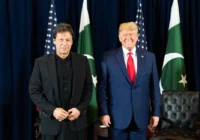On September 27, Pakistani Prime Minister Imran Khan delivered an impassioned speech at the UN General Assembly in New York that has sent heads spinning. Taking to the podium for over 50 minutes, he addressed four themes that conjoin inextricably.
The first topic was climate change. Pakistan is not a significant contributor to climate change, yet it faces considerable risks with the melting of Himalayan ice, which could have significant implications for the water supply in the country. Climate change is an important international concern, and Khan highlighted the plight facing developing countries that are not the perpetrators of the problem, but are often the net receivers of most of the disadvantages associated with it.
His next subject referred to money laundering and how it hurts developing societies. Their economies are often crippled by national debt due to the need to sustain various development initiatives, but are unable to do so without external assistance. Primarily, there is a huge drain on the nation’s finances when elites siphon off vital funds and deposit them in personal bank accounts in London and New York. However, when attempts made to retrieve these monies move forward, the legal systems of these countries prevent speedy solutions, leaving the affected nations no better off in the short or long term. Some of these lifted funds end up diverted to finance terrorism and, therefore, it is doubly urgent that this matter is concentrated on swiftly.
The emotional tone of his speech heightened when he moved on to discuss Islamophobia. A complex, tricky and highly-disputed term, the concept contains a powerful message that aims to highlight what is effectively hatred toward Islam and Muslims. It is difficult to imagine a national leader taking to the podium at the UN schooling avid listeners on the nature of a form of vindictive, hateful racism that affects Muslim groups across the world by virtue of their faith, often in addition to their skin color and cultural norms.
Islamophobia has become hyper-normalized, not only in the “global north,” in places such as Western Europe and North America where there are 40 million Muslim minorities, but also in the “global south,” in places such as India with its 180 million Muslim minorities often on the receiving end of various forms of systematic racism.
While Khan did not highlight this topic in his speech, the incarceration of over 2 million Chinese Uighur Muslims suggests the globalizing of these issues, but with little global attention on the matter. All of these outcomes are various manifestations of Islamophobia, which has individual, structural, societal, cultural and legal characteristics.
The final part of the speech was devoted to the topic of Kashmir, and rightly so given the urgency of the current situation. The content of his speech on Kashmir highlighted a number of important concerns regarding the foundations of hate toward Muslims. Indian Prime Minister Narendra Modi’s recent election victory on the back of pronunciations in relation to fighting terrorism and projecting a global vision over the greatness of India is directly from the playbook that we are witnessing in the US, Britain, parts of Europe and Turkey. Various governments gain power when they demonize immigrants and minorities, thereby displaying all the xenophobic tropes seen in populism throughout the ages.
Nationalism
The idea of the strongman facing down cosmopolitan elites — which is code for educated minorities working in the center of power, culture and politics — is a way of shoring up the support of less-educated masses. These supporters are mobilized by the idea of the show of strength in the face of an internal menace at the hands of “others.” In the end, these politically authoritarian actors are merely shoring up their own status and privileges associated with cozying up to the billionaire class, whose interests are in reducing taxes, securing offshore tax havens and being held to scrutiny as little as possible.
In the case of India, there are concerns in relation to unemployment, imbalance in relation to regional economic development and inflationary pressures on the wider economy. Instead of being addressed in terms of domestic social policy reforms, these issues are presented as outcomes created by undesirable “others.” This leads to hate and anger being vented in their direction, rather than of governments whose responsibility it is to the entire nation.
But in the further case of India, the rise of Modi has come alongside the demonization of Muslims in India and elsewhere, especially toward Pakistan, which is seen as a harbinger of terrorism that is often exported to India by Pakistan. However, Modi has a history of looking the other way when Muslims are faced with pogroms, namely in Gujarat in 2002. With the ideology of the Hindu nationalist Rashtriya Swayamsevak Sangh (RSS) embedded in the ruling Bharatiya Janata Party (BJP), it is essentially a form of deeply-held racism and casteism underpinned by anti-Muslim and anti-Christian sentiment as an attempt to evoke a sense of a pure race of Hindus.
This politicization of religion is akin to radicalization, extremism and fundamentalism associated with similar processes in relation to other parts of the world. For around 60 days now, 8 million people have faced lockdown in Indian-administered Kashmir. They are being prevented from using telecommunications or traveling. Young people cannot attend schools, colleges and universities. Kashmir is unable to obtain important medical supplies for its peoples.
The 70 years or so years of systematic oppression, marginalization and exclusion at the hands of various Indian governments, which has now placed over 900,000 troops on the borders of Jammu and Kashmir, has reached a new level of despair. With stories of rapes, humans rights abuses, incarceration of young people in the tens of thousands, regular nightly raids and a strict curfew, it is no surprise that Khan uses the idea of an open-air prison to describe the reality facing these 8 million Kashmiri Muslims.
Still at Odds
While both India and Pakistan have gone to war three times over Kashmir, the position of Islamabad has fundamentally changed in relation to the disputed territory. It now places firmly at the fore the view that the right to self-determination is the only solution to the Kashmir question. This is a major step and an important role in light of the fact that the world often turns its eyes away from Kashmir because it sees it as a bilateral problem between India and Pakistan. In doing so, it silences the Kashmiris. Yet now, Pakistan is taking a very different line that places the hopes and futures of Kashmiris in their own hands.
There is no doubt about the fact that Pakistan has its own problems, and Kashmir has been an issue that has plagued the country for many years. Both the US and India routinely accuse Pakistan of nurturing and training terrorists in the country and then exporting them to various neighboring conflicts. However, this would be to deny the historical origins of this observation.
When the Soviets invaded Afghanistan in 1979, Pakistan was working alongside the Americans to train the mujahedeen, supplying them with logistical, military and operational support. As the conflict with the Soviets ended in 1989, these mujahedeen were effectively left on their own. Although trained, battle-hardened and still tribalistic, the formation of the Taliban came about as a way in which to prevent tribal killings, rape and internecine conflict between the Afghans. By the mid-1990s, the Taliban were mobilized in relation to a radical Islam that emerged from outside of the country.
With the events of 9/11 drawing in Pakistan into the “war on terror,” over 70,000 Pakistanis have lost their lives, largely as a result of attacks on them by other Muslims mobilized by their own misunderstandings of radical political Islam.
By the mid-2000s, the Islamization of the country that began under the auspices of General Muhammad Zia-ul-Haq in the early 1980s took a turn for the worse as this radicalization in Afghanistan spread into Pakistan. It has affected the experiences of minorities of every hue and faith, and it led to a diminishing of recognition for the diversity of language and culture that was the mosaic of Pakistan when it was first established. Pakistani General Pervaiz Musharraf had to introduce “enlightened moderation” to disassociate himself and the wider country from the growing problems of political Islam within it and in Afghanistan. Osama bin Laden was found in Pakistan and killed there by US special forces in 2011.
Resolving the Kashmir Conflict
Toward the end of Imran Khan’s stirring speech, he alluded to the idea that “Islamic radicalization” is not an ideologically religious phenomenon, but one that emerges out of oppression, marginalization and humiliating experiences at the hands of internal or external agitators, whose means and methods exist to obliterate Muslims. The only way to defend against these kinds of attacks is by putting their “hand on the gun,” or in the case of Pakistan, the finger on the nuclear button.
Such talk is certainly likely to arouse an embittered population in Pakistan who have never heard a national leader speak in such electrifying terms for at least four decades, with the last being Zulfiqar Ali Bhutto in the early 1970s. However, this is the tragedy of the situation. Nobody wants war and certainly not a nuclear war. Nobody wants innocent people to suffer such an inhumane existence.
In the world today, there are too many people on the receiving end of systematic violence and oppression, exclusion and annihilation in certain cases, but too much of the world looks away in disdain. This is arguably the most disturbing part of this recent political act by India in relation to scrapping Kashmir’s special status. Too much of the world is oblivious to what is going on or simply too disinterested to care. But when this happens, there is room for pockets of radicalization across the Muslim world. And when then there is an incident, an entire faith or country is blamed. Action is taken against certain groups who are targeted en masse, and then it starts all over again.
The people of the world need to understand how the situation in Kashmir is a fundamental violation of every human rights consideration on the planet. There can only be a diplomatic solution, especially in light of 70 years of toil and suffering. Exercising the right to self-determination of Kashmiris is the only solution to this malaise. The world needs to act now before it is too late.
*[A version of this article was cross-posted on the author’s blog.]
The views expressed in this article are the author’s own and do not necessarily reflect Fair Observer’s editorial policy.
Support Fair Observer
We rely on your support for our independence, diversity and quality.
For more than 10 years, Fair Observer has been free, fair and independent. No billionaire owns us, no advertisers control us. We are a reader-supported nonprofit. Unlike many other publications, we keep our content free for readers regardless of where they live or whether they can afford to pay. We have no paywalls and no ads.
In the post-truth era of fake news, echo chambers and filter bubbles, we publish a plurality of perspectives from around the world. Anyone can publish with us, but everyone goes through a rigorous editorial process. So, you get fact-checked, well-reasoned content instead of noise.
We publish 2,500+ voices from 90+ countries. We also conduct education and training programs
on subjects ranging from digital media and journalism to writing and critical thinking. This
doesn’t come cheap. Servers, editors, trainers and web developers cost
money.
Please consider supporting us on a regular basis as a recurring donor or a
sustaining member.
Will you support FO’s journalism?
We rely on your support for our independence, diversity and quality.







